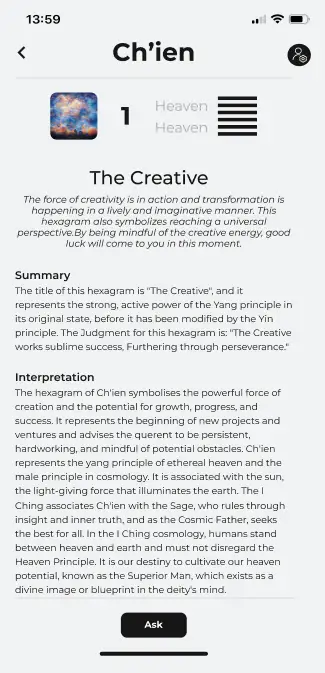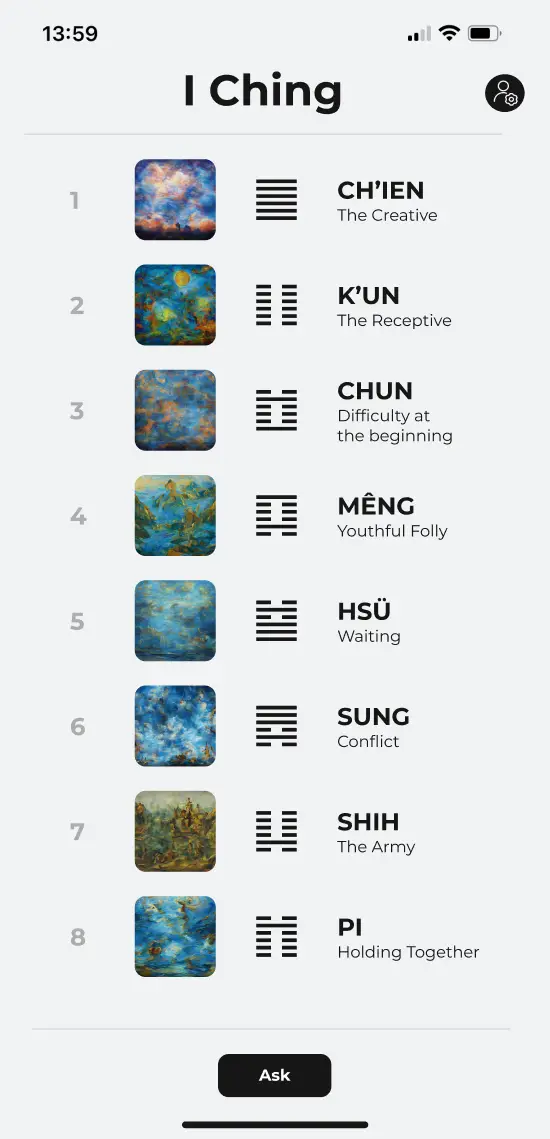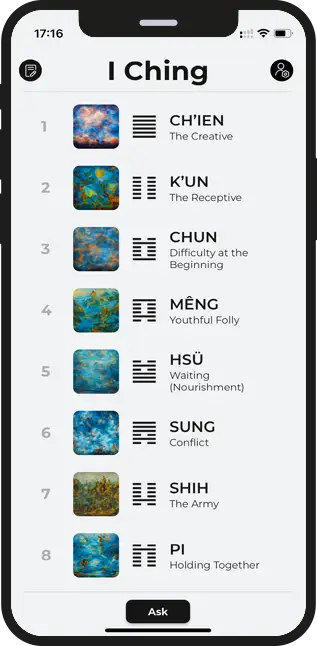
Heaven
Water
Hexagram 6 - Conflict - SUNG
Instead of asking "Why?" disengaging from internal or external conflict is often more productive.
Summary
This represents a state of conflict, tension, and struggle. The key takeaways from the judgment and image of this hexagram are that conflict can be resolved through open communication and compromise and that one should not be too quick to react in a state of conflict.
Interpretation
Asking why things are the way they are and what to do about them conflicts with the Creative, as one needs to show more trust in the Creative's ability to guide and reveal the ambiguity of a situation at the right time. The hexagram represents inner and outer conflicts, but ultimately, internal conflict is the root cause of all other forms of conflict. When we view the world, others, or ourselves negatively, it creates inner conflict. The hexagram advises disengaging from the question and leaving everything unresolved, as this is the only way to gain a proper perspective. It also suggests being prepared for potential conflicts by being alert to clues and responding only to the essentials of a situation. The key is emotionally detaching from the problem and trusting that the Creative will guide us to the correct resolution.
Sage Advice
The best advice from Hexagram 6, "Conflict," can be summarised as being patient, listening, being open to communication, being humble, respecting the rights of others, and being willing to find a middle way to resolve conflicts. The I Ching advises to "never resort to arms" and to "make no mistakes," emphasising the importance of avoiding aggression and finding peaceful resolutions. It also recommends being mindful of one's actions and avoiding any activities that may lead to further conflict. Additionally, it advises being open to compromise and willing to make concessions to find a solution. These spiritual pieces of advice can be seen as a guide for self-improvement and inner growth and can be applied in many aspects of life. In the face of conflicts, it is essential to approach them with humility and flexibility, listening to the other person's perspective, being open to communication and being willing to find a middle way that respects the rights of all parties involved.
Line 1
Suggests that it is best to address conflict early on before it has a chance to escalate. By choosing to disengage or withdraw from the situation, one can avoid becoming overly invested in trying to change things. It also advises being mindful of ego and how it may influence one's actions. In the end, this can lead to good fortune, as one avoids being caught up in a negative cycle of conflict.
Line 2
It is important to avoid engaging in conflicts, primarily when driven by ego. A superior person recognises this and chooses to retreat and remain neutral, allowing the situation to unfold naturally. This approach protects oneself from guilt and brings about a beneficial outcome for all involved. It is crucial to keep a clear mind and avoid getting caught up in the emotions of a situation. Instead, wait for the right time to act and let the Sage guide you towards a solution.
Line 3
To rely on one's established virtues brings success but also danger. It is best to avoid seeking attention or recognition in serving a king. The key to success is to stay true to one's virtues, even when it means working behind the scenes or being patient and persistent. The ego may push for recognition and fame, but true success is humility and focusing on serving the greater good. It is essential to avoid the temptation to intervene or assert oneself in situations where others may be seen as doing wrong, as this can lead to trouble. Trust in the natural process of growth and development, and let your light shine through your actions rather than your words.
Line 4
Inner conflict can lead us to take shortcuts in pursuing our goals, but progress can only be made by staying true to the path of correctness. Instead of engaging in conflict, one should turn back, submit to fate, and change one's attitude to find peace in perseverance. By being patient and accepting that progress takes time, one can find success and good fortune.
Line 5
When faced with a conflict, the best course of action is to entrust the situation to the wisdom of the Sage and the guidance of fate. By doing so, the resolution will be handled most appropriately and bring about outstanding success. Trusting in a higher power to guide the outcome brings peace of mind and the assurance that the outcome will be for the greater good.
Line 6
The constant rumination of a problem only leads to more significant confusion and self-doubt. Instead of persevering with this futile pursuit, it is best to release it and let fate take its course. Even if a temporary solution presents itself, it will be fleeting and ineffective—trust in the natural progression of events rather than fixating on a futile struggle.








